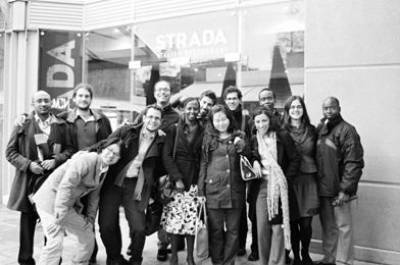Celebrating ten years of the Education Unit
3 May 2016
UCL Institute of Neurology Education Unit was established ten years ago (on 1st May 2006). Dr Caroline Selai, Head of the Education Unit, presented their top 10 key innovations from the decade at the UCL Teaching and Learning Conference 2016, which will be highlighted as a case study on the UCL Teaching and Learning portal.
“Since the Education Unit was established we have been engaged in a fascinating and energising decade-long ‘Action Research’ project. During these 10 years we have been constantly reviewing our practice, self-reflecting, gathering feedback, making changes, introducing pioneering teaching and learning innovations, gathering more feedback, testing hypotheses, experimenting with students as teachers and teachers as students, introducing new masters and MRes programmes “ Dr Caroline Selai, Head of UCL Institute of Neurology Education Unit
In the interview below, David Blundred, Head of Teaching and Learning Support, looks back on his time at the Education Unit
1) Can you tell us a little bit about your background and how you came to Queen Square?
I came here by chance, and can say that I was very fortunate that Daniela Warr (my predecessor) and Dr Caroline Selai gave me the opportunity to work here. Before arriving at Queen Square I had spent time in Canada and Thailand, along with a few temporary positions in London. I knew that I wanted to work at a university and so applied for a lot of different positions within quite a few of the universities in London and after many interviews and rejections I was given the job of course administrator within the Education Unit.
Dual Masters in Brain and Mind Sciences 2008-09. (David Blundred is third from right).
2) How has Queen Square /the Education Unit changed over the past 10 years?
It has changed a lot in the 8 years I have been here. When I first started we had 4 MSc programmes (the Advanced Neuroimaging programme was new in my first year) and around 50 students. We now have 10 MSc/MRes/Diploma programmes and around 220 students! I have to say that I miss the smaller numbers, when it was really possible to get to know every student, and to stop and chat in the cluster room. I have been fortunate to meet many inspiring people and make some good friends from the postgraduate students who have passed through Queen Square.
3) What’s been your highlight? And what have been the challenges.....?
The major highlight has been the opportunity to meet so many people from around the world and to make long lasting friendships with people. In this regard, the Queen Square Alumnus Association (that I revived in 2009) has been very useful in maintaining contact and also building relationships with Queen Square Alumni. I have really enjoyed producing the newsletter, speaking with so many alumni and the conference we held in 2013 remains a highlight for me. The challenges have been trying to maintain the same level of service for the students despite the doubling of programmes offered and amount of students studying here.

Clinical Neurology 2009-10.
4) What changes do you foresee over the next decade.....?
I think this is difficult to predict. When tuition fee increases were announced I felt sure that would result in a decrease in student numbers, and yet we have actually seen a massive increase on most programmes. We are all been encouraged to offer more flexibility and more blended learning opportunities (distance learning and face to face), and this presents its own challenges in maintaining quality etc. We are also moving much more to a way of thinking whereby students see themselves as customers and I think we all have to react to this and accept that as students pay more they expect more from the courses they are studying. I think it will be interesting to see if a future government would reverse some of these changes and invest more in Education, in a way that countries like Germany have. That would be my hope.
Further information: Education Unit webpages
 Close
Close

